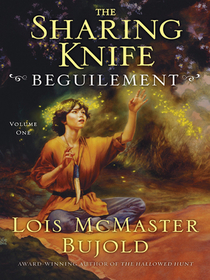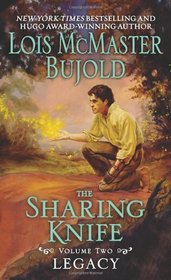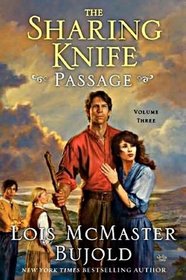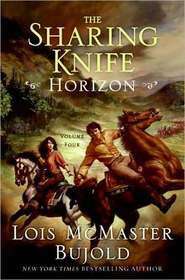THE SHARING KNIFE is a four-volume fantasy series by Lois McMaster Bujold. Bujold is well-known for her science-fiction series, marketed as the Vorkosigan Saga, and her fantasy series set in the World of the Five Gods. She sometimes has a romance element and that’s very strong here.
WARNING: The first book has semi-graphic descriptions of a miscarriage, and it is referred to several times over the course of the four volumes. Some may be sensitive to the topic.
BEGUILEMENT, the first book, introduces the world, but it’s definitely more concentrated on the romance between the two protagonists, Fawn and Dag. Fawn, unmarried and pregnant, runs away from the family farm, is abducted by creatures controlled by a monstrous malice, and has to be rescued by the Lakewalker patroller Dag.
Dag is a Lakewalker, people with a talent known as “groundsense” – they can feel “ground”, the life force that emanates from everything. Malices, or blight bogles, are things that emerge from the earth and suck the ground from everything around them, while at the same time making and controlling other beings. If not stopped they could potentially kill off everything living in the world. Lakewalkers hunt malices. Only they can kill a malice with a very specialized knife, thus the title SHARING KNIFE Fawn is of the farmer society, in this world just regular people without Lakewalker talents. This is an agrarian society, with no evident government or ruling class.
Back to the plot. Fawn is left with major injuries and while nursing her back to health, she and Dag fall irretrievably in love. But marriage between a Lakewalker and a farmer is not done. Even casual hookups are seriously frowned upon. How can they possibly make a life together when both societies don’t just disapprove, but are ready to cast them out?
Bujold is a master at keeping the reader involved; Fawn and Dag are of course very likable characters and the reader wants them to get together. But this reminds me too much of Harlequin romance. Dag and Fawn hit an awful lot of cliches. Looked at with a critical eye, Fawn in particular is just too, too sweet. And if you’re in a critical mood, the age gap between them will leave you grinding your teeth. There were a couple more things that grated. Nonetheless, I still liked BEGUILEMENT and in fact I liked it best of the four. But none of these books are meant as standalones, they build one on the next.
Book 2: LEGACY. Fawn and Dag are newly married by farmer customs but have also created their Lakewalker marriage cords. The cords are made and infused with the ground of each partner, and swapped. Each person can feel the live ground of the other and know they are still alive and well. Dag had to do some interesting groundwork in order for Fawn to get her ground into the cord, but it worked.
That is pretty much the entire bit that this book hangs on. Much slower paced than the first, it tells how the couple travel to Dag’s home Lakewalker camp, and the struggle they have to convince the Lakewalkers they are really, truly, married. Dag has to go on a patrol to kill a dangerous malice and is badly injured along with many others. No one will listen to Fawn’s desperate pleading until she takes off on her own to find him. This time she gets to save his life. There’s a lot of family tension in this book, and a lot of the same arguments over and over again.
In book 3, PASSAGE, Dag and Fawn have left Hickory Lake Camp. After the malice disaster that befell Greenspring, Dag can’t stop thinking about all the farmers who died as opposed to the relative few Lakewalkers. He believes that if farmers knew more about and trusted Lakewalkers, that wouldn’t happen again. But Hickory Lake Camp isn’t going for it. Dag has also promised to take Fawn to see the ocean, so they’re going to travel downriver on a flatboat. A lot of characters will be added, including Fawn’s brother Whit. Of course they’re going to meet up with river pirates enslaved by a renegade Lakewalker. Dag learns a lot more about his abilities as a maker, and gets to save Fawn’s life again. And they make it to the ocean. We see a bit more of this world’s people and scenery, and the flatboat travel is interesting.
Lastly, HORIZON: On the road again, they can’t wait to be on the road again…oops sorry about that. Fawn has found out about an expert “maker” and off they go, leaving the riverboat crew at Greymouth and hoping the maker will take Dag on as an apprentice. And so he does, after the usual arguments about whether the two are really married (that’s definitely getting old). It’s all great until a farmer kid is dying of lockjaw and Dag breaks his promise not to treat farmers. And so, on the road again, collecting an even bigger assortment of farmers and Lakewalkers in the group. The awful malice attack this time includes mud-bats, which I thought was an inspired idea of Bujold’s and definitely cringe-worthy. It’s killed with a method I was wondering about since the first book, nice to have that explained. The book ends with a few pages concerning a visit from one of the other characters. It’s out of place enough that I can’t help but think Bujold intended to keep the series going, but didn’t, although she did wrap up that bit with THE KNIFE CHILDREN, a short novella available as an e-book.
While I enjoyed the series, it’s not on par with her other two, but I’d still rank it above many other fantasy/romance series I’ve tried. It feels uneven in that the romance is consummated, if you will, in the first volume, and after that the married couple is just trying to find their place in society. Binge-reading the series left me a little bored with the constant explanation of ground, Lakewalker abilities, and prejudices of the two societies. (I should know better than to binge-read, this always happens.) All the characters feel well fleshed out, the imagery is great especially in the battle scenes, and the idea of groundsense is quite interesting. It might have been better to have a little conflict between Fawn and Dag, they are besotted with each other and there’s never a cross word. It’s not very realistic, but I felt it made the series a good “comfort read”.





